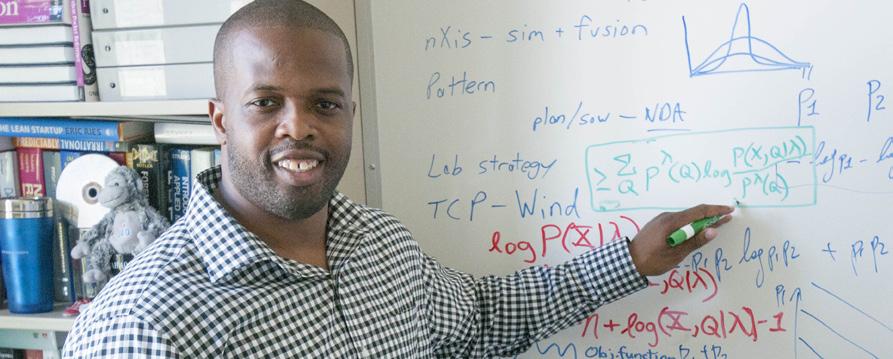
5 minute read
Engineering Healthcare
by Lango Deen ldeen@ccgmag.com
Janeen Uzzell had been working at GE Medical Systems (now GE Healthcare) for about five years by the summer of 2007 when health-care leaders across America met at an annual senior executive event.
The conference’s theme was “The Future is Now: Effective Leadership in a Global Healthcare Environment.”
Five thousand miles away in Ghana, the GE Foundation, the philanthropic arm of GE, had launched its Developing Health Globally initiative, providing medical equipment, water desalination units, and power generators to the West African country’s
resource-poor hospitals, health centers and maternal child health posts.
Yet one of the keynote speakers at the four-day event was unimpressed.
An international consultant in healthcare, he compared the American system to the MTV show, “Pimp My Ride,” where a rapper and his crew transform an old vehicle into a flashy, moving music sound station, reported a St. Thomas newspaper.
“American health care places unbelievable amounts of high technology into a frame that is fired by an old,
ineffective engine,” he said. Its system “rewards procedures, and not keeping people healthy.”
But GE professionals like Uzzell were in “the grind” with “eyes on the ground” providing “diversity of thought, creativity, and decision-making.”
Inspired by her mother, a successful businesswoman, and an older sister who was a nurse, Uzzell often dreamed of wearing a white swan
uniform someday, but an older cousin who was studying engineering motivated her to take a different path. Although Uzzell started with an engineering Janeen Uzzell Global Director of Operations, GE Global Research, External Affairs, and Technology Programs
education—a mechanical engineering degree from North Carolina A&T State University coupled with an M.B.A. from Fairleigh Dickinson University—little did she know that her field would open a range of possibilities in organizing projects in healthcare and business. A published expert in maternal and newborn health, Uzzell has served as an advisor on edgy technology for small- and medium-sized organizations and co-chaired the Medical Device Task Force for the Innovative Working Group hosted by the United Nations.
Before GE she worked on validation engineering at Johnson & Johnson, then a small startup, which sent her to Brazil as part of the global development of Yellow Fever vaccination and coached her career forward with the sponsorship of her M.B.A.
Later, from 2002 through 2005, Uzzell led a team of service engineers in GE Medical Systems (now GE Healthcare), who serviced healthcare equipment. The kind of big box GE technology in hospitals, such as CAT scans, MRIs, and x-ray machines.
“While I was leading the healthcare service business, GE started to run healthcare disparity programs,” Uzzell recalled. “GE Healthcare was funding a health program at Harlem Hospital, which had one of the top trauma centers,” she said.
The program was called “Hip-hop Stroke,” set up to teach children about the leading cause of disability among adults in the U.S.
Brain attacks, which strokes are, impact a high percentage of elderly foster parents and parents-with-care in the African-American community.
GE’s stroke program was at the hospital Uzzell worked as a service operations manager so they asked her to manage it. First, she started with information tables on stroke, handing out pamphlets on symptoms, available treatment at hospitals, and getting doctors to take blood pressure. Then Uzzell took up more volunteering in New York. Next, she was traveling out of state with healthcare programs focused on the improvement of health in diverse communities. After a while, Uzzell was going as far as Kenya in east Africa with a Christian healthcare ministry.
Before long, Uzzell was considering ‘sharpening her skill’ internally, integrating the market and good management into improving healthcare disparity programs and global health care. By the time a career opportunity
came up to travel to Ghana, she had a proven track record at GE as one of the go-to people for healthcare.
When GE’s chief technology officer in the office for healthcare called Uzzell about a position in the GE Foundation’s Developing Health Globally program in Ghana, she bought in.
GE’s goal was going to focus on donating equipment, make sure the equipment was installed and properly serviced, and that there were sustainable water and energy services.
It was the whole works, Uzzell said, but “we didn’t want to just drop and dash,” she added.
Uzzell became an advocate in positioning GE as a trusted advisor in rural health. She strategized with ministries of health and heads of state in east and west Africa, and global partners, on how to align GE’s innovation to solve health challenges and expand access to healthcare through “disruptive” models. As the director of healthcare programs and healthymagination for GE Africa, she led a team focused on building solutions for health in some of the world’s most challenging environments.
Currently, Uzzell is global director of operations with GE Global Research External Affairs and Technology Programs.
She oversees operational and business development aspects of external funding for technology programs in healthcare, aviation, and energy, while carrying out the strategy and vision of the External Affairs and Technology Programs organization.
“When we started on the journey to provide better health to all people, we focused on reverse engineering our products to ensure quality, access and affordability for low resource settings,” Uzzell said.
“Our results, though time consuming, enabled the VSCAN, handheld ultrasound to go to market and it now services women globally,” she added.
“We are now a Digital/ Infrastructure company, and the Internet of Things brings advanced intelligence to everything we do…and so now we can solve the world’s toughest problems and deliver the best solutions faster and smarter. What took us years to build and deliver in the past will be enhanced by our innovative systems. It’s brilliant. We’re getting better every day.” S
GE IN SUSTAINABLE HEALTHCARE
In June, General Electric opened a new $13 million GE Healthcare Skills and Training Institute, an education facility for healthcare professionals.
Dr. Cleopa Mailu, cabinet secretary, Ministry of Health for Kenya and John Flannery, president & CEO of GE Healthcare, in Nairobi, Kenya, launched the center. Through the new facility, GE will train over 10,000 healthcare professionals from across Kenya and East Africa by 2020.



Farid Fezoua, president & CEO, GE Healthcare Africa said, “The center will support the development of a pipeline of biomedical engineers, radiologists and technicians. This commitment to healthcare capacity building will help to reduce the country’s skills gap, improve job prospects and build a solid national healthcare system and private healthcare sector.”







